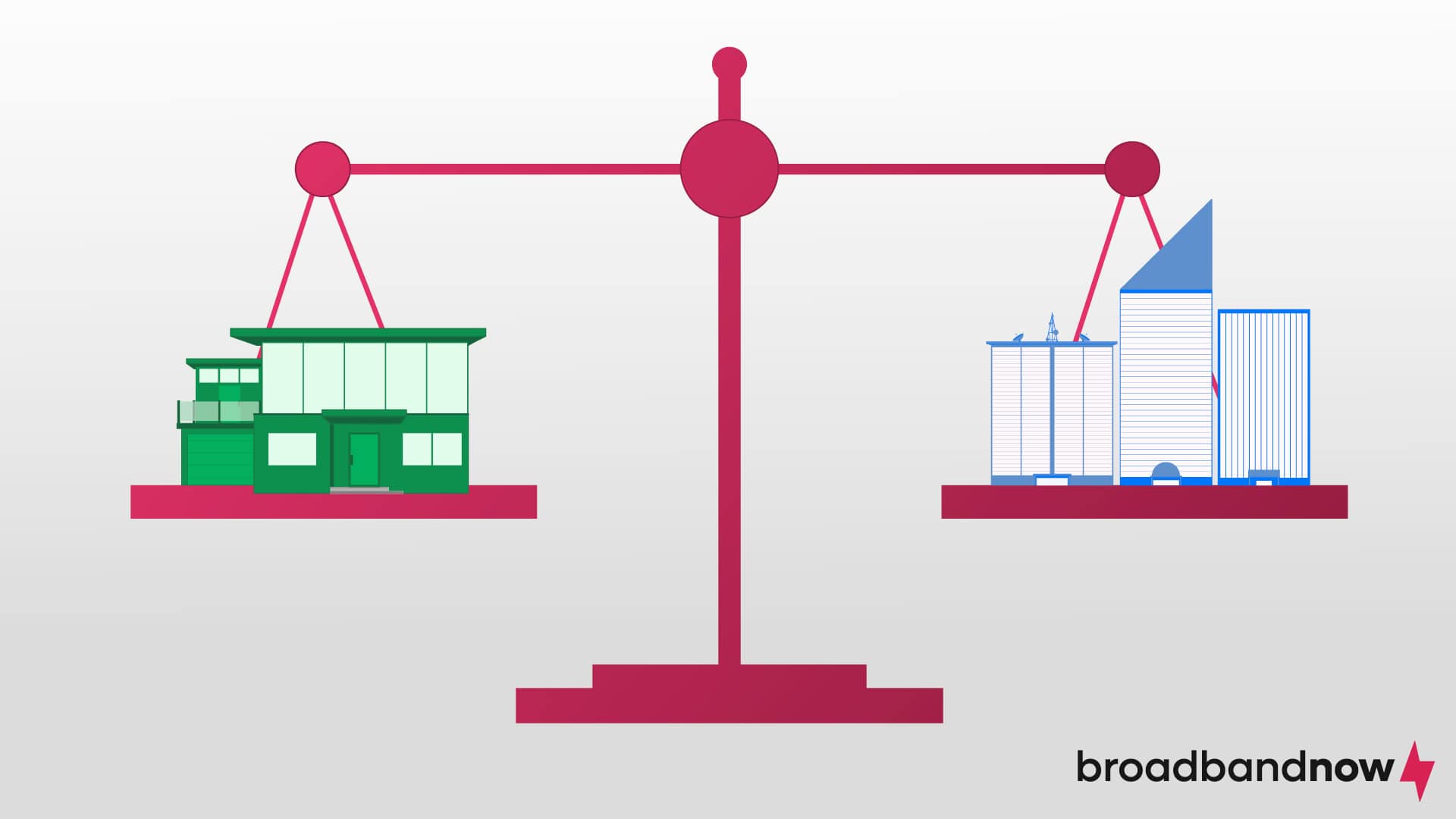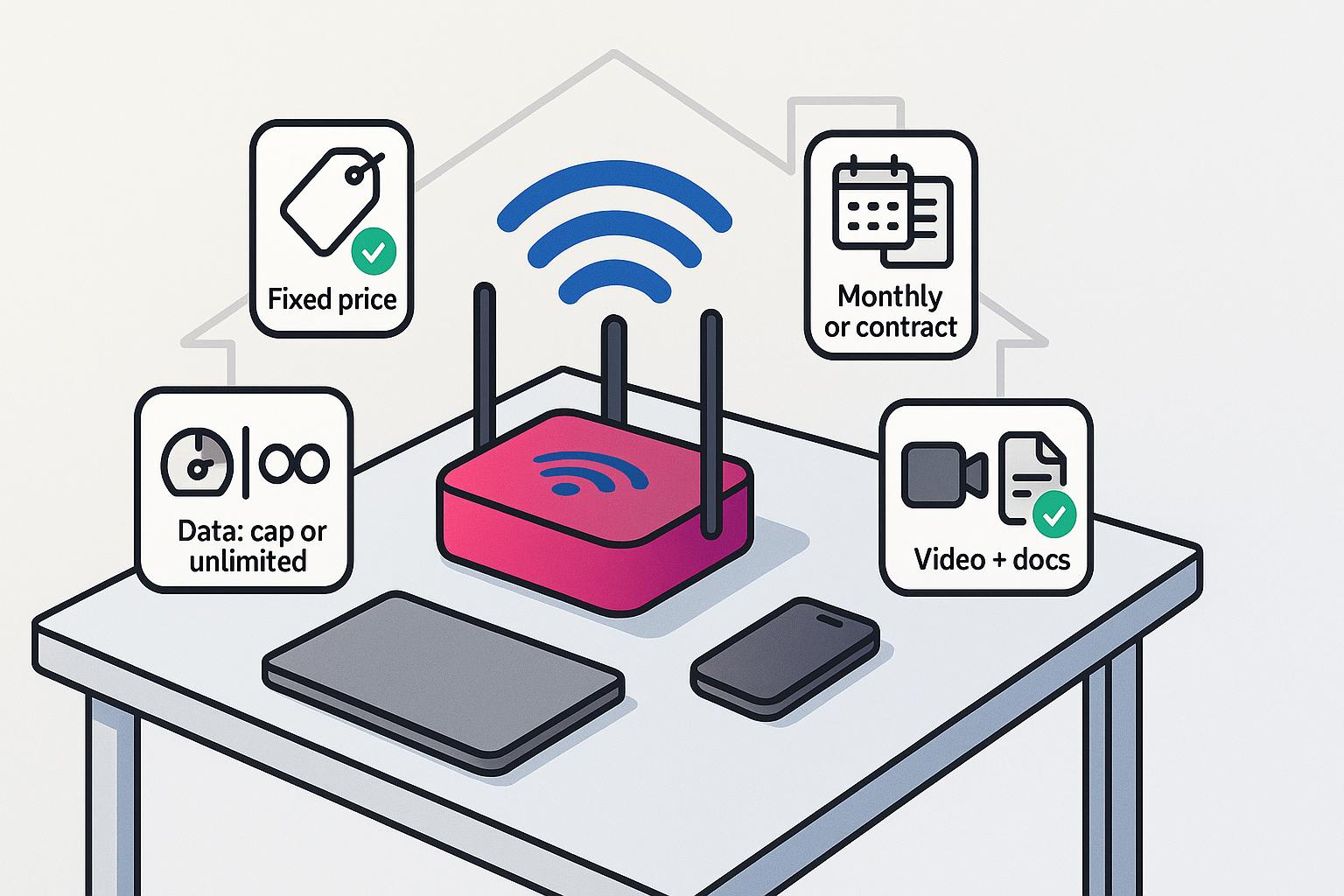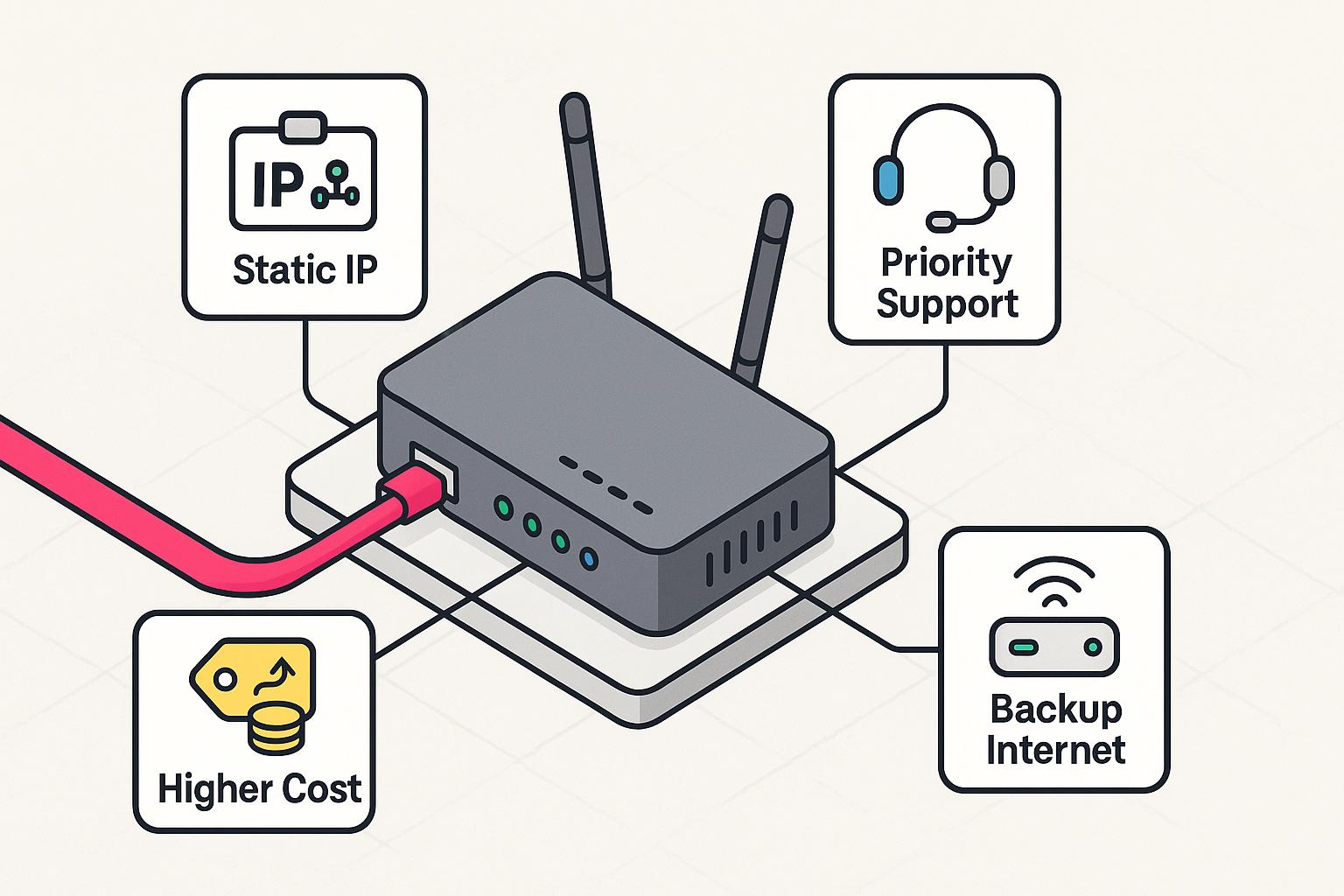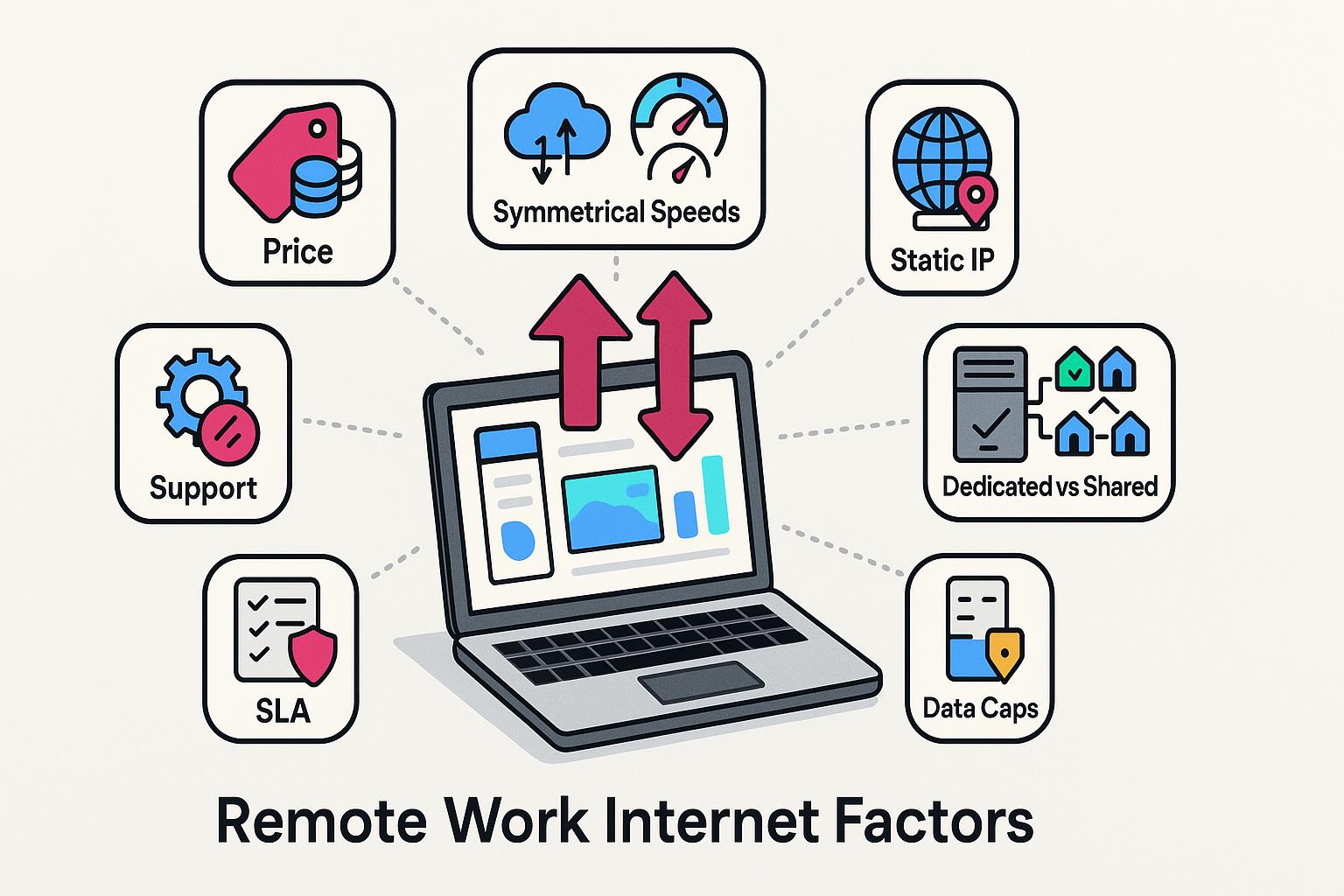Residential vs. Business Internet: Which Should You Choose?
Learn the differences between residential and business internet, and see which one better fits your work needs.

- Remote workers can use either residential or business internet when working from home.
- Residential internet is perfect for remote employees who need to check emails, access documents, and conduct video or voice calls.
- Business internet is ideal for remote workers who own their own business and need additional features such as dedicated connection and business-level customer service.
Remote and hybrid work continues to be a major part of the modern workplace. With remote work still a standard option for many professionals, choosing between residential and business internet has become an important consideration. Here’s a breakdown of the key differences between the two services so you can make the best choice for your household and business needs.
Table of Contents
- Residential Internet: Get Work Done Remotely
- Business Internet: Make Your Internet Work for You
- Comparing Residential vs. Business Internet
- What to Consider When Buying Internet for Remote Work
- Verdict: The Best Internet for Your Work
- Internet Providers That Offer Business Internet
Residential Internet: Get Work Done Remotely

Internet service providers (ISPs) offer residential internet plans as their default service. It’s your standard, run-of-the-mill internet plan. Every internet plan includes internet speeds for a fixed price, either monthly or on a multiyear contract. Some plans have data caps, while others may include unlimited data. Because of its affordability and consumer-friendly service, most remote workers opt for residential internet, especially employees who only need to conduct video calls or access company-specific documents.
Business Internet: Make Your Internet Work for You

Ideal for business owners or people who want to make the most of the remote-work lifestyle, business internet is an upgrade from standard residential internet. In addition to fast internet speeds, business internet plans come with a host of features designed to keep businesses running online. The perks include a dedicated connection, business customer support, static IP addresses, and backup internet. Business internet comes at a heftier price than residential internet, though, so it’s worth considering the pros and cons before making your decision.
Comparing Residential vs. Business Internet
Now that we understand what residential internet and business internet offer in general, let’s consider how they compare side by side.
| Residential internet | Business internet | |
|---|---|---|
| Pros |
|
|
| Cons |
|
|
What to Consider When Buying Internet for Remote Work

Regardless of which internet plan you purchase, there are a few factors you’ll want to consider. Although residential and business internet plans are different, there are some similarities and overlaps in their plans, prices, and features.
Price
Price is most people’s biggest factor when deciding between a residential and business internet plan. Business internet plans are more expensive, and although they offer all the sweet perks listed above, most people conclude that the high cost is not worth the price tag.
Residential internet plans are usually much more affordable, especially if you can secure a special discount or promotion. Spending a significant amount of money on internet service, however, is not always the best idea for people whose businesses are still in the early stages.
Symmetrical Connections
There are two different speeds: download speed and upload speed. Download speed measures how fast your internet connection can download information, while upload speed measures how fast your internet connection can upload data. You need both to do activities online, especially video conferencing and data transfers. With symmetrical connections, the download and upload speeds are the same. You’ll find symmetrical connections with fiber internet providers.
Both business and residential internet plans can offer symmetrical connections, but it’s more common with business internet. From managing websites to running an online storefront, business owners are typically offered fiber internet since it’s the best internet type available.
Static IP
An internet protocol (IP) address is a unique address that identifies a device on the internet or a local network. IP addresses can be either static or temporary. The benefit of using a static IP address is that it’s usually better for functions such as hosting a website or email server and using a whitelisted server, which allows you to use services provided by another business.
Business internet connections usually come with static IP addresses or permanent numbers assigned by the ISP, whereas residential internet connections use temporary IP addresses that change each time you use the internet. A residential service may be good enough if your business doesn’t require that ability to function effectively.
Dedicated Connections
Dedicated connections are a feature that differentiates business internet from residential. Also known as dedicated internet access (DIA), a dedicated connection is a private connection for your business’s exclusive use, which helps eliminate lagging and buffering.
On the other hand, residential internet connections employ shared internet access, in which multiple users share the same bandwidth. That means you and the neighbors on your block are all sharing the same bandwidth even though you may have your own internet service. That can affect internet performance if the amount of users is high.
Technical Support
Few things are as frustrating as needing customer service, but you won’t have to worry about such a problem when you purchase a business internet plan. Unlike residential plans, business internet plans have access to technical support that’s available almost 24/7.
That distinction is based on the requirement that a business has internet access at all times, especially if it primarily operates online. Business plans also tend to enjoy higher-quality assistance in technical matters.
Service-Level Agreements
Business internet plans include service-level agreements, which stipulate terms and conditions such as performance standards and the services that will be provided. A clear understanding of what you’re getting can help you operate your business connection to the best of your ability.
Residential internet connections don’t have these agreements. Instead they have “best effort” promises, which are less binding and sometimes misleading.
Data Caps
Data caps are limits on how much internet data you can consume. Business internet plans typically aren’t bound by data caps, which means you and your employees can browse to your hearts’ content. On the other hand, some residential internet plans come with data caps, which can be a headache for large households with multiple devices. Plenty of ISPs, however, don’t impose data caps on their residential plans.
Verdict: The Best Internet for Your Work
Which internet is the best for remote workers? What’s the best internet for business owners? It all depends on your individual internet and business needs. Whether you’re just editing documents or conducting video calls, choosing between residential and business internet will depend largely on how often you’ll be using the internet and for what purposes. Generally, it’s best to look through business plans offered by ISPs that serve your area to see which of them align with your business needs and work style.
Internet Providers That Offer Business Internet
Most ISPs offer both residential and business internet solutions. We put together a list of the top ISPs that offer business internet, but many more providers are starting to build business internet plans with their services.
| Internet provider | Starting price | Download speeds |
|---|---|---|
| AT&T Business Internet | Starting at $60 per month | Up to 5 Gbps |
| CenturyLink Business Internet | Starting at $55 per month | Up to 940 Mbps |
| Comcast Business Internet | Starting at $74 per month | Up to 1.25 Gbps |
| Kinetic Business by Windstream | Starting at $74.99 per month | Up to 1 Gbps |
| Optimum Business Internet | Starting at $60 per month | Up to 8 Gbps |
| Spectrum Business Internet | Starting at $40 per month | Up to 10 Gbps |
Frequently Asked Questions About Residential and Business Internet
Do I need a business internet plan for my business?
No, a business internet plan is not required, but they often come with perks that can greatly benefit business owners.
Is business internet faster than residential internet?
Business internet usually offers faster plans than residential internet. Most ISPs also offer dedicated connections with business internet, so you can run your business digitally without worrying about heavy online traffic.
Should I switch to business internet if I have residential internet?
We recommend you make the switch to business internet if you need the dedicated support and additional features that business internet provides. If you don’t need those extra features, residential internet is probably fine for your situation.
What are some perks that come with business internet?
Business internet comes with a variety of perks, including dedicated internet connections, business customer support, internet backup, and cybersecurity services.
Is business internet more expensive than residential internet?
Yes, business internet is usually more expensive than residential internet due to the dedicated customer service and other features that come with it.